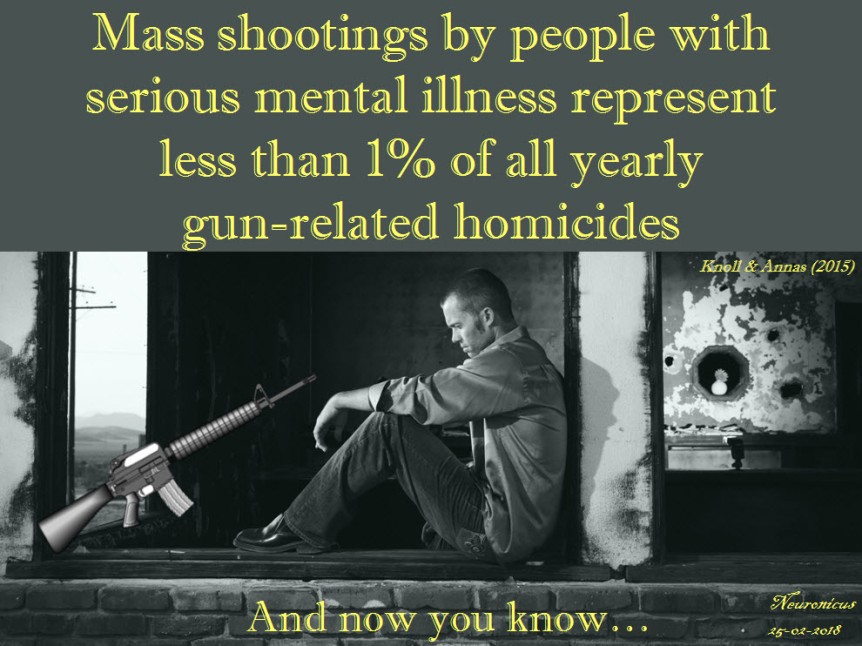By Neuronicus, 25 February 2018
On Valentine’s Day another horrifying school mass shooting happened in USA, leaving 17 people dead. Just like after the other mass shootings, a lot of people – from media to bystanders, from gun lovers to gun critics, from parents to grandparents, from police to politicians – talk about the link between mental illness and mass shootings. As one with advanced degrees in both psychology and neuroscience, I am tired to explain over and over again that there is no significant link between the two! Mass shootings happen because an angry person has had – or made to think they had – enough sorrow, stress, rejection and/or disappointment and HAS ACCESS TO A MASS KILLING WEAPON. Yeah, I needed the caps. Sometimes scientists too need to shout to be heard.
So here is the abstract of a book chapter called straightforwardly “Mass Shootings and Mental Illness”. The entire text is available at the links in the reference below.
From Knoll & Annas (2015):
“Common Misperceptions
- Mass shootings by people with serious mental illness represent the most significant relationship between gun violence and mental illness.
- People with serious mental illness should be considered dangerous.
- Gun laws focusing on people with mental illness or with a psychiatric diagnosis can effectively prevent mass shootings.
- Gun laws focusing on people with mental illness or a psychiatric diagnosis are reasonable, even if they add to the stigma already associated with mental illness.
Evidence-Based Facts
- Mass shootings by people with serious mental illness represent less than 1% of all yearly gun-related homicides. In contrast, deaths by suicide using firearms account for the majority of yearly gun-related deaths.
- The overall contribution of people with serious mental illness to violent crimes is only about 3%. When these crimes are examined in detail, an even smaller percentage of them are found to involve firearms.
- Laws intended to reduce gun violence that focus on a population representing less than 3% of all gun violence will be extremely low yield, ineffective, and wasteful of scarce resources. Perpetrators of mass shootings are unlikely to have a history of involuntary psychiatric hospitalization. Thus, databases intended to restrict access to guns and established by guns laws that broadly target people with mental illness will not capture this group of individuals.
- Gun restriction laws focusing on people with mental illness perpetuate the myth that mental illness leads to violence, as well as the misperception that gun violence and mental illness are strongly linked. Stigma represents a major barrier to access and treatment of mental illness, which in turn increases the public health burden”.
REFERENCE: Knoll, James L. & Annas, George D. (2015). Mass Shootings and Mental Illness. In book: Gun Violence and Mental Illness, Edition: 1st, Chapter: 4, Publisher: American Psychiatric Publishing, Editors: Liza H. Gold, Robert I. Simon. ISBN-10: 1585624985, ISBN-13: 978-1585624980. FULLTEXT PDF via ResearchGate | FULLTEXT PDF via Psychiatry Online
The book chapter is not a peer-reviewed document, even if both authors are Professors of Psychiatry. To quiet putative voices raising concerns about that, here is a peer-reviewed paper with open access that says basically the same thing:
Swanson et al. (2015) looked at large scale (thousands to tens of thousands of individuals) data to see if there is any relationship between violence, gun violence, and mental illness. They concluded that “epidemiologic studies show that the large majority of people with serious mental illnesses are never violent. However, mental illness is strongly associated with increased risk of suicide, which accounts for over half of US firearms–related fatalities”. The last sentence is reminiscent of the finding that stricter gun control laws lower suicide rate.
REFERENCE: Swanson JW, McGinty EE, Fazel S, Mays VM (May 2015). Mental illness and reduction of gun violence and suicide: bringing epidemiologic research to policy. Annals of Epidemiology, 25(5): 366–376. doi: 10.1016/j.annepidem.2014.03.004, PMCID: PMC4211925. FULLTEXT | FULLTEXT PDF.
Further peer-reviewed bibliography (links to fulltext pdfs):
- Guns, anger, and mental disorders: Results from the National Comorbidity Survey Replication (NCS-R): “a large number of individuals in the United States have anger traits and also possess firearms at home (10.4%) or carry guns outside the home (1.6%).”
- News Media Framing of Serious Mental Illness and Gun Violence in the United States, 1997-2012: “most news coverage occurred in the wake of mass shootings, and “dangerous people” with serious mental illness were more likely than “dangerous weapons” to be mentioned as a cause of gun violence.”
- The Link Between Mental Illness and Firearm Violence: Implications for Social Policy and Clinical Practice: “Firearm violence is a significant and preventable public health crisis. Mental illness is a weak risk factor for violence despite popular misconceptions reflected in the media and policy”.
- Using Research Evidence to Reframe the Policy Debate Around Mental Illness and Guns: Process and Recommendations: “restricting firearm access on the basis of certain dangerous behaviors is supported by the evidence; restricting access on the basis of mental illness diagnoses is not”.
- Mental Illness, Mass Shootings, and the Politics of American Firearms: “notions of mental illness that emerge in relation to mass shootings frequently reflect larger cultural stereotypes and anxieties about matters such as race/ethnicity, social class, and politics. These issues become obscured when mass shootings come to stand in for all gun crime, and when “mentally ill” ceases to be a medical designation and becomes a sign of violent threat”.

By Neuronicus, 25 February 2018

